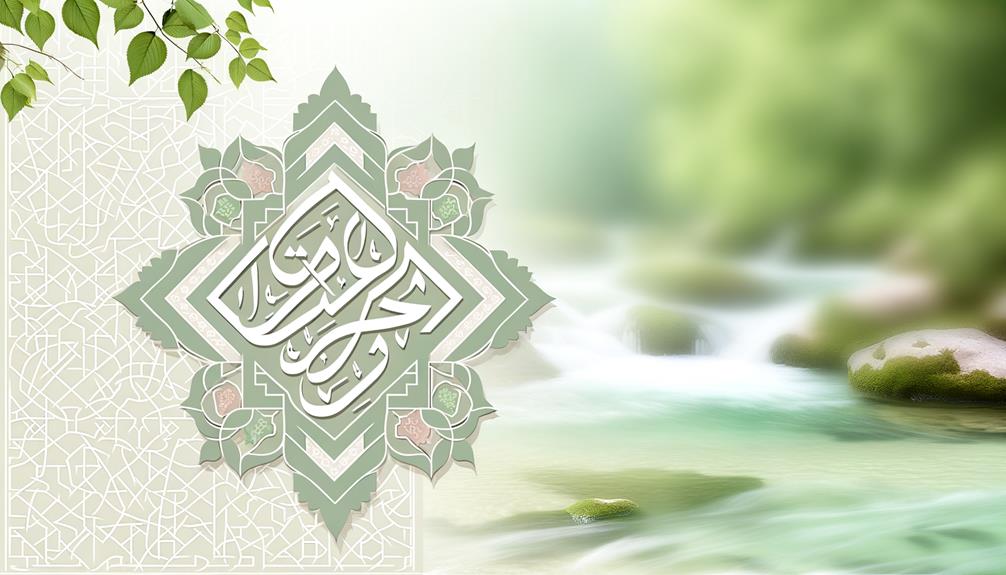Haroon Name Meaning in Urdu
In Urdu, the name Haroon holds deep historical and religious significance. Derived from the Hebrew name Aaron, it symbolizes strength, leadership, and wisdom.
Revered in Islamic tradition as a Prophet and brother of Prophet Musa (Moses), Haroon is celebrated for his eloquence and support. This name is profoundly respected in Urdu culture, reflecting qualities of ancient wisdom and guidance.
It's a popular choice in modern naming trends, showcasing a blend of historical depth and cultural resonance. When you understand the name Haroon, you see a rich tapestry of heritage and meaning waiting for you.

Key Takeaways
- Haroon means "exalted" or "high mountain" in Urdu.
- The name signifies strength, leadership, and wisdom.
- It holds religious significance in Islam and Judeo-Christian traditions.
- Haroon symbolizes trust, integrity, and ancient wisdom in Urdu culture.
- The name maintains cultural heritage and is popular in modern naming trends.
Historical Origins
Haroon's historical origins frequently trace back to ancient Semitic cultures, particularly within the context of religious texts and traditions. You'll find that the name Haroon is deeply woven into the fabric of early civilizations in the Middle East.
It's derived from the Hebrew name Aaron, which means 'high mountain' or 'exalted.' This name has been carried through generations, signifying strength and leadership. In various cultures, Haroon has maintained its significance, often reflecting attributes of wisdom and guidance.
Understanding its roots in Semitic history helps you appreciate its enduring legacy. The name's journey through time showcases how cultural and historical intersections shape personal identities, providing a deeper connection to heritage and ancestry.
Religious Significance
Tracing its roots in early Semitic history, the name Haroon holds profound religious significance, especially within Islamic and Judeo-Christian traditions.
In Islam, Haroon is revered as a prophet and the brother of Prophet Musa (Moses). The Quran honors him for his eloquence and support to Musa during their mission to free the Israelites from Pharaoh's bondage.
In the Bible, Aaron (the English equivalent) is celebrated as the first High Priest of the Israelites, known for his role in the Exodus and his priestly duties.
Cultural Impact
You'll notice that the name Haroon carries historical significance in Urdu culture, often linked to revered figures.
This name's influence extends to modern naming trends, where it's still popular among parents.
Additionally, Haroon frequently appears in Urdu media and literature, reinforcing its cultural resonance.
Historical Significance in Urdu
In the rich tapestry of Urdu culture, the name Haroon carries significant historical weight, often evoking images of ancient wisdom and leadership. You'll find its roots in Islamic history, where Haroon (Aaron) was the brother of Prophet Musa (Moses), known for his eloquence and support.
This revered figure is celebrated for his role in guiding and advising his community, embodying virtues like faith and resilience. Haroon's legacy extends beyond religious texts, influencing literature and poetry, where the name symbolizes trust and integrity.
Understanding this name's historical significance helps you appreciate its cultural depth, showing how it's woven into the moral and ethical fabric of Urdu-speaking societies. Embrace this rich heritage when considering the name Haroon.
Influence on Modern Names
The name Haroon continues to shape modern naming conventions in Urdu-speaking communities, reflecting its enduring cultural resonance and timeless appeal. You'll notice its influence in various aspects of contemporary life.
Here are three ways it manifests:
- Naming Trends: Many parents opt for Haroon, inspired by its historical and religious significance.
- Cultural Identity: Choosing Haroon helps preserve cultural heritage and reinforces a sense of belonging.
- Modern Adaptations: Variants like Haris and Harun often arise, showcasing linguistic creativity while maintaining traditional roots.
Media and Literature Representation
Beyond its influence on naming trends, Haroon has also made a significant mark in media and literature, where its cultural impact is vividly portrayed.
You'll find characters named Haroon in various novels and films, often embodying wisdom, leadership, and resilience. For instance, in Middle Eastern literature, Haroon al-Rashid is a historical figure frequently depicted in stories and tales, symbolizing justice and prosperity.
In contemporary media, the name Haroon is used to reflect traditional values while adapting to modern narratives. By engaging with these representations, you can gain a deeper appreciation of the cultural and historical layers that the name Haroon encompasses, enriching your understanding of its significance beyond mere nomenclature.
Linguistic Analysis
Delving into the linguistic roots of the name Haroon, you'll discover its origins in ancient Semitic languages, reflecting rich cultural and historical significance. Tracing back to Hebrew and Arabic, the name Haroon (or Aaron) carries profound meaning.
Here's a breakdown:
- Hebrew Origin: Haroon derives from 'Aharon,' meaning 'mountain of strength' or 'high mountain,' suggesting nobility and resilience.
- Arabic Adaptation: In Arabic, Haroon maintains similar connotations, often associated with the revered prophet and brother of Moses.
- Phonetic Consistency: Across both languages, the name retains a consistent pronunciation, symbolizing its enduring legacy.
This linguistic journey reveals how Haroon's etymology intertwines with cultural narratives, lending depth to its significance in Urdu and beyond.
Popularity in Urdu
Understanding the rich etymological roots of Haroon, you can appreciate why it enjoys widespread popularity in Urdu-speaking communities. The name Haroon carries historical significance, tracing back to religious figures and ancient tales. It's not just a name; it's a link to revered traditions and cultural heritage.
In Urdu, Haroon evokes a sense of respect, wisdom, and leadership, qualities highly valued in the culture. Parents often choose this name, hoping to imbue these attributes in their children. You'll find Haroon frequently mentioned in literature, poetry, and daily conversations, reflecting its deep-rooted presence in Urdu society.
This widespread usage underscores its enduring appeal and the cultural resonance it holds among Urdu speakers.
Modern Interpretations
In contemporary contexts, Haroon is often interpreted through the lens of modern values while retaining its historical reverence. You'll find that the name Haroon continues to resonate deeply in Urdu-speaking communities, blending tradition with present-day ideals.
Cultural Significance: Haroon still carries the weight of its biblical and Quranic roots, embodying wisdom and leadership.
Modern Appeal: Parents choose Haroon not just for its historical value but also for its stylish sound and easy pronunciation.
Personal Identity: For many, Haroon represents a bridge between past and present, offering a sense of continuity and cultural pride.
Understanding these modern interpretations enhances your appreciation of Haroon's enduring legacy.
Conclusion
In exploring Haroon’s name meaning in Urdu, you’ve navigated a rich tapestry of history, religion, and culture. Like a well-woven carpet, each thread represents a unique aspect—be it its historical roots, religious depth, or modern interpretations. One can understand the significance of Haroon’s name in Urdu by delving into its cultural context and examining its associations with the Islamic faith. Similarly, one can also uncover the layers of complexity behind the meaning of Zoyan in Urdu, which may reveal its connections to tradition and heritage. By taking the time to explore the nuances of these names, one gains a deeper appreciation for the intricate beauty encapsulated within them.
This name, cherished in Urdu-speaking communities, not only carries profound significance but also resonates with contemporary relevance. Embrace Haroon's legacy; it's a timeless journey through the past and present, deeply embedded in cultural and linguistic beauty.






